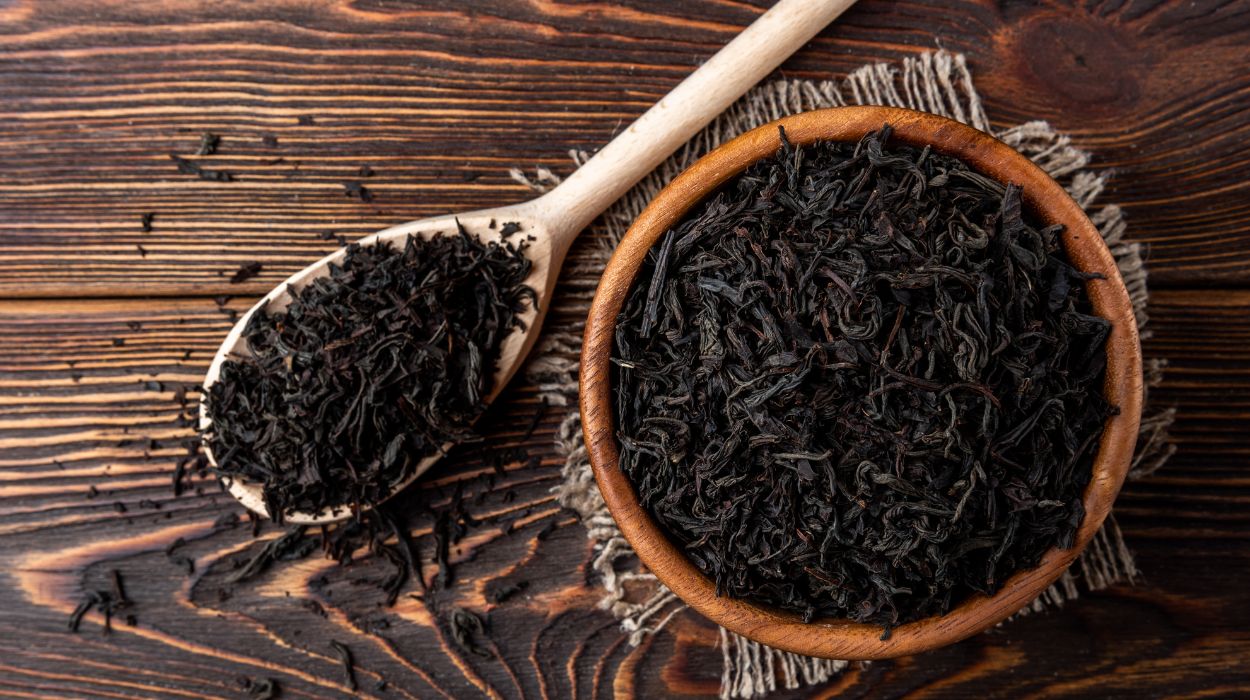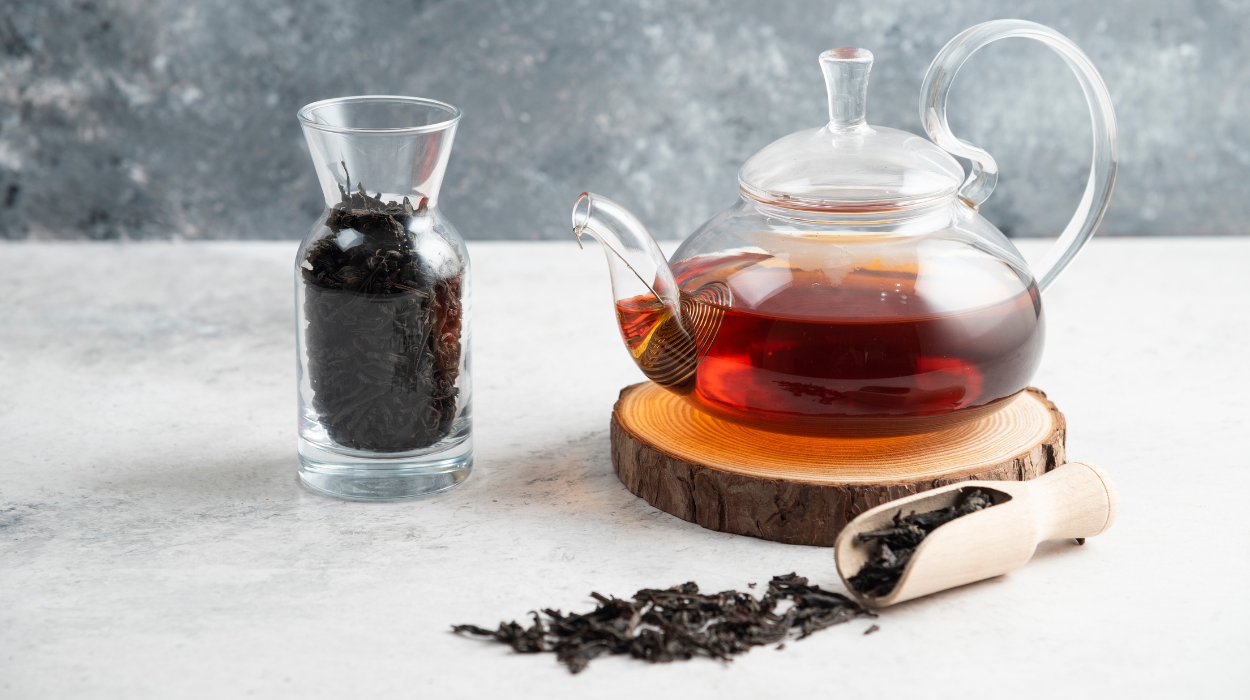Black tea has a strong malty flavor that some people love and others don’t. But is black tea effective in promoting weight loss? Will it aid in your quest to lose weight?
Many health and fitness professionals may warn against drinking black tea first thing in the morning. Black tea’s caffeine level makes it a potential jitter-inducing beverage to drink while intermittent fasting. Now the question is, how can you drink black tea without risking your health?
If you’re trying to lose weight, this article will go over some of the possible black tea benefits and how it could support your weight loss journey.
Is Black Tea Good For Weight Loss?
This depends. Even though black tea won’t magically make you lose weight, it could complement healthy eating and exercise plans.
It contains polyphenols such as catechins and theaflavins, which may accelerate metabolic processes and fat oxidation. Caffeine, in moderation, boosts energy expenditure, which contributes to calorie burn.
Furthermore, the ability of black tea to decrease hunger and maintain good gut microbiota complements a well-rounded weight-management strategy.
However, reactions vary by individual, and maintaining weight loss is dependent on a variety of factors, including general lifestyle choices, exercise regimes, and a healthy diet.
Is Black Tea Good For Weight Loss?

One of the most often consumed tea varieties worldwide is black tea, though there are many more, such as oolong tea, green tea, white tea, etc.
According to research, drinking tea can help prevent obesity since it can improve fat metabolism and lower calorie intake by inhibiting of fat digestion and absorption. This is because black tea contains a lot of polyphenols[1] – healthy plant chemicals.
If you’ve been wondering how black tea aids in weight loss, here are several proven ways:
Black Tea Promotes Healthy Gut Bacteria
In recent years, black tea has become a possible champion in the fight for a balanced gut microbiota.
Black tea polyphenols, especially its catechins, are prebiotics, meaning they encourage the growth of beneficial bacteria[2] like Lactobacillus and Bifidobacterium.
A healthy microbiome is associated with better metabolism and a decreased risk of obesity.[3]
Black Tea Is A Beverage Low In Calories
Teas are similar in that they are low in calories.[4] Black tea is good for weight loss since it naturally lowers your overall calorie consumption.
For those who are dieting or looking for the best tea for weight loss, a cup of black tea can be used in place of a high-calorie, high-sugar diet alternative.
Black Tea Could Aid In Stress Reduction
Black tea contains the amino acid L-theanine, which promotes relaxation and stress[5] reduction. As a matter of fact, L-theanine enhances alpha brain wave activity,[6] which helps you feel composed without inducing drowsiness.
Stress encourages overeating and weight gain in several ways. For example, it triggers the release of the hormone cortisol,[7] which is connected to fat accumulation.
Black tea’s relaxing qualities help prevent stress-related overeating, making it an excellent option for weight loss. Additionally, the antioxidants in black tea may benefit your health and help you live a more pleasant lifestyle overall.
Black Tea May Help Control Appetite
Black tea is one of the frequently used appetite suppressant teas. This is often because it’s widely believed that drinking black tea daily will restrict hunger. So, how true is this?
Ghrelin is our hunger hormone, whereas leptin is our satiety hormone. In obesity, these hormone levels can go out of control. According to research, theaflavins in black tea may help with leptin resistance.
Leptin resistance[8] impairs the body’s ability to respond to its own fullness signals, which can lead to overeating and weight gain. It has been claimed that the polyphenols in black tea, specifically flavonoids, improve the body’s ability to regulate appetite via improving leptin sensitivity.
Because black tea reduces leptin resistance, it may help people build a healthier relationship with food and their body weight.
Remember that a lot of research on black tea and its ability to decrease appetite is still ongoing. According to a review of research on the plant chemicals in tea, the majority of the evidence on their appetite-suppressing qualities is inconclusive.[9]
Even though it’s intriguing that black tea may help reduce hunger, further research is required to determine how much and how often to drink it.
Fat Oxidation Induced By Caffeine
Just like green tea extract, black tea extract contains moderate amounts of caffeine. Research indicates that coffee or caffeine consumption[10] is linked to improved weight control.
Further research shows that caffeine enhances fat burning during fasting exercise, but the catechin content in black tea enhances fat burning even more.
That being said, caffeine may not be all that it seems. It turns out that the impact of caffeine – or lack thereof – on fat oxidation is highly dependent on the placebo effect.[11]
For example, in one study, those who were told they had taken caffeine when, in fact, they had taken a cellulose pill saw the same boost in fat oxidation as those who had taken actual caffeine.
Other Health Benefits Of Black Tea

Aside from black tea’s benefits for weight loss, additional health benefits of black tea include:
Strong Antioxidant Properties
Black tea contains potent antioxidants called polyphenols.
Black tea’s primary antioxidant sources include groups of polyphenols called catechins, theaflavins, and thearubigins, which may also improve general health.
Black tea has multiple catechin types,[12] including epicatechin-3-gallate, EGCG, epigallocatechin, and epicatechin. Because of its powerful impacts on health and weight, EGCG is one of the most studied catechins.
Exercise raises the body’s oxidative stress and inflammatory levels, impairing healing and athletic performance. Black tea catechins can reduce inflammation[13] and oxidative stress, which can hasten healing and enhance athletic performance.
Additionally, catechins can permeate the blood-brain barrier,[14] shield brain tissue, and raise dopamine and other neurochemical levels.
Because weight loss is correlated with exercise, reducing oxidative stress and inflammation may help with weight loss. Additionally, increased dopamine levels may increase your likelihood of completing challenging tasks,[15] including developing an exercise routine.
Encourages Heart Health
Evidence[16] shows that consuming black tea is associated with lower blood pressure, which is beneficial for heart health.
According to research, black tea lowers blood sugar, enhances blood cholesterol, and lowers the onset of cardiovascular disorders.[17] It also can prevent cancer because of the polyphenol component.
Overall, drinking black tea daily enhances the body’s capacity to produce antioxidants, which can lower the chance of developing chronic illnesses.
Improves Cognition And Mental Wellness
Black tea has been shown to reduce the aging process[18] of the brain and enhance memory and attention in particular. You’ll probably be less inclined to jump up and grab the cookie jar if you’re concentrated on the work at hand, which translates to less daily calorie consumption and snacking.
Being less prone to depression[19] may also be beneficial. This is because those who are depressed tend to exercise less and turn to food more often than those who are not depressed to deal with their feelings.
Possible Side Effects
Among the potential negative effects of black tea are:
Nausea
According to certain research, drinking black tea may raise your chance of experiencing gastrointestinal adverse effects,[20] including nausea. This is more likely to happen if you drink black tea on an empty stomach.
Drug Interactions
Black tea’s constituents have a wide range of drug interactions because they modulate the activity of several enzymes in the body, which in turn affects how pharmaceutical drugs are metabolized.
Before drinking black tea on a daily basis, make sure it doesn’t conflict with any drugs you may be on.
Mycotoxin
When black tea is properly handled and stored, the fungus shouldn’t grow there. However, improper storage can cause mold to grow on tea leaves, which can then release chemicals known as mycotoxins[21] that are harmful to people’s health.
Other potential negative consequences of drinking a lot of black tea include:
- Faster breathing.
- Nausea and vomiting.
- Jitteriness
- Nervousness and restlessness.
- Increased urination.
- Ringing in the ears.
- Irregular heartbeat.
- Anemia.
- Anxiety and difficulty sleeping.
- Headache.
- Tremors.
- Seizures.
Black tea has the potential to reduce hunger, but when taken as supplements or diet pills, the constituents can be present in unknown amounts, which raises the possibility of negative consequences.
Conclusion
Although black tea has many health benefits, does it also aid in weight loss? Indeed, research[17] indicates that drinking black tea can help reduce body fat and increase fat burning during weight loss.
It may not help you lose weight immediately, but it may be helpful when used in conjunction with other weight-loss techniques. Black tea may help reduce hunger, promote fat burning, improve metabolic efficiency, increase energy levels, and boost weight loss efforts.
The amount of caffeine in black tea can affect some drugs, and tolerance to the tea varies from person to person. It’s a good idea to discuss your diet and lifestyle, including frequent exercise,[22] with a qualified dietitian if you’re not sure whether to include black tea in your regimen
In the end, you are the only one who truly knows you, so make sure the adjustments you make will benefit you.
Frequently Asked Questions
While the polyphenols and mild caffeine in black tea may aid with weight loss, a well-rounded strategy that includes physical activity and healthy eating is necessary for long-term success.
Despite differences in taste and reactivity, both green and black tea can aid in weight loss. Choose the one that best suits your preferences and way of life.
When trying to reduce weight, drinking black tea as part of a well-rounded program may be beneficial. The best approach on how to lose weight entails drinking enough water, eating a well-balanced diet, and exercising frequently.
Drinking black tea in between meals may help you regulate your hunger. Consider it an addition to a well-balanced diet and weight-loss regimen.
Although black tea isn’t specifically a fat burner for women, the caffeine in it can enhance your metabolism. Additionally, the caffeine and L-theanine included in black tea may aid dieters in their weight loss efforts. However, individual reactions may differ.
Black tea may aid in weight loss, but it is only one component of a healthy lifestyle. The key to success is moderation and consistency.
If you want to get the caffeine out of your system, hydrate with water, herbal teas, or decaffeinated versions.
 Evidence Based
Evidence Based
